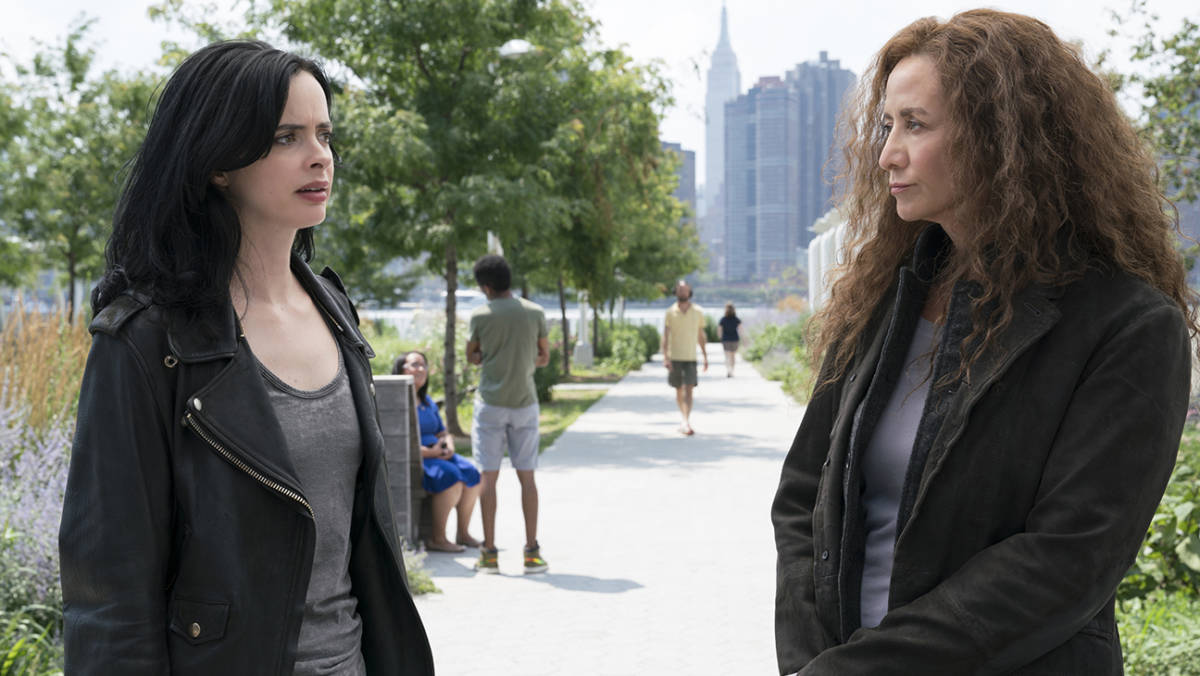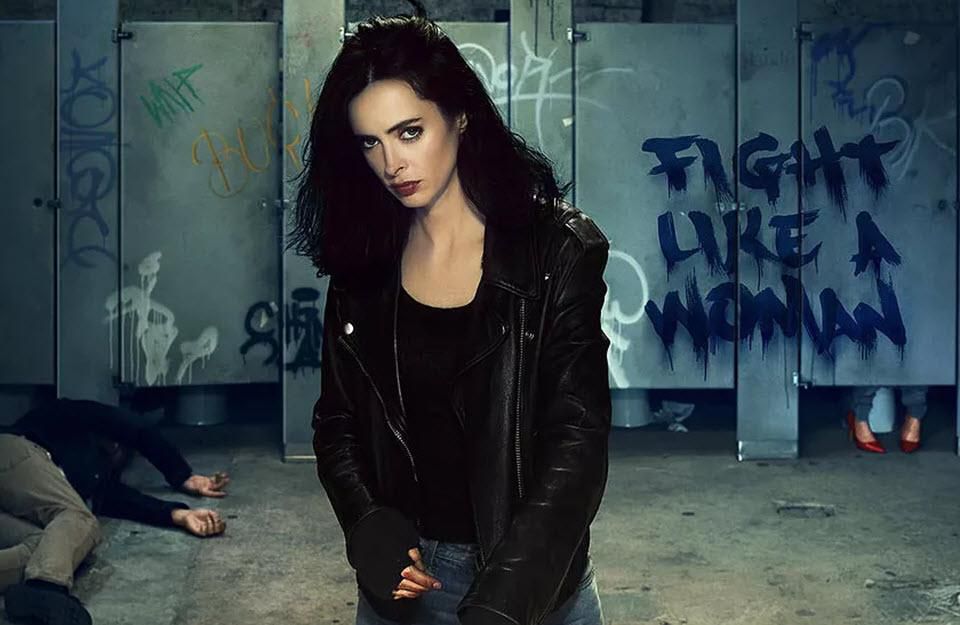Jessica Jones is back, and she’s just the hero 2018 needs. Premiering on International Women’s Day and in the midst of the #MeToo and Time’s Up movements, Jessica Jones‘ second season is perhaps even more relevant than its first. In execution, however, it’s a bit of mixed bag.
Story-wise, the season never really finds a narrative hook to latch onto, nor does it find a compelling villain. Where it does succeed is in its portrayal of strong, fully-developed female characters, and its tackling of a number of the issues facing women today. It’s the perfect moment for Jessica’s unique, no-frills brand of heroism – a reminder that women can kick ass. Unfortunately, there just aren’t very many worthwhile asses to be kicked this season.
After her well-received role in the Defenders miniseries, the hard-drinking, super-strong private eye has returned to her neo-noir roots. When powered people start turning up dead, a reluctant Jessica finds herself at the center of a new mystery that forces her to confront her past and come to grips with her own superhero origin story. Trish, Malcolm, and Jeri Hogarth return to help Jessica track down the killer (Janet McTeer), a woman whose powers and past are inextricably tied to Jessica’s own.

Season 2’s plot is slow and meandering, and like many of the other Marvel Netflix series, is stretched out over too many episodes. The central mystery of Jessica’s powers is pretty much answered from the jump, with very few developments of consequence save for a twist here and a turn there. Most of the season is spent chasing after the mystery villain, who doesn’t even come close to the sinister gravitas that David Tennant brought to season 1’s big bad Kilgrave.
Kilgrave was pure evil – a malevolent presence haunting Jessica’s every move, and an out-and-out villain for her to defeat. This new killer carries no such weight, less evil and more troubled. She ultimately fails to prove menacing or engaging – a powerful female villain who could have been a strong foil for Jessica amounts only to a wasted opportunity. There’s never a satisfying climax or conclusion to their conflict. Instead of a real fight, all we get is a talk-heavy back-and-forth fraught with indecisiveness and moral ambiguity. None of that sounds like Jessica Jones. Perhaps that was the point – to teach Jessica that there are shades of grey. Unfortunately that grey looks pretty drab on Jessica Jones, despite her subdued fashion sense.
Jessica Jones’ cast and characters are where the season really comes to life. Despite not having much of a larger story to work with, each character is faced with personal struggles that advance their arcs in new and interesting ways. Krysten Ritter’s performance as the titular detective is as cynical and biting as ever, with touches of warmth and optimism that indicate necessary growth for the character. Rachael Taylor taps into the darker side of Trish Walker, peeling back “Patsy’s” impeccably pure facade to reveal hidden layers of jealousy, hypocrisy, selfishness, and obsession. Eka Darville’s Malcolm takes on a larger role at Alias Investigations, steering his life away from addiction toward a career, and from passivity into assertiveness and independence. Finally, Carrie-Anne Moss breaks Jeri Hogarth down and builds her back up, displaying a range that includes surprising vulnerability on one end of the spectrum, and chilling vindictiveness on the other.
The show’s character-driven approach is ultimately able to redeem some of the season’s narrative flaws. It’s also responsible for producing a cast of strong, realistic female characters, and cementing the show’s position as an achievement in feminist entertainment. This is a show about women who are both powerful and flawed, and refuse to fit neatly into any particular mold.
https://www.youtube.com/watch?v=hSvnepZS26s
It’s impossible to talk about Jessica Jones without acknowledging how important its representation of strong women is at this particular moment in our culture. In the wake of the wave of sexual misconduct allegations that have swept through Hollywood in the last year, the challenges facing women in a male-dominated society are at the forefront of viewers’ minds. Seismic changes in the direction of equality are coming to Hollywood, and hopefully to the world at large. With a second season directed entirely by women, Jessica Jones is leading the charge.
When it comes to the widespread sexism that women face on a daily basis, the show doesn’t pull any punches. Literally. Jessica punches misogyny in the face. The show tackles everything from sexual assault to addiction to mental health – all through the lens of female perspectives. (The absence of women of color among the main cast is a noticeable and unfortunate omission, though not one that feels intentional or malicious. Perhaps it can be rectified in season 3?)
What I found surprising was how accurately and frequently the show depicts more subtle gender discrimination. Just the way random men in Jessica Jones talk to women is telling. Quips about women’s appearance, perceived femininity, and strength relative to men are pervasive. What’s even more surprising is that for every time Jessica has a witty response, there’s an instance where a rude remark passes without comment. In 2018, even the strongest woman on the planet still has to pick her battles.
Jessica Jones doesn’t beat you over the head with its feminist message, preferring to show instead of tell. But it’s there clearly for anyone who’s willing to hear it. Jessica Jones is a painfully human hero, with all of the flaws and baggage that come with personal tragedy, as well as the strength to rise above them. She’s not a female hero, but a hero who happens to be female. It’s an important distinction. Jessica’s heroism has nothing to do with her gender, save for the fact that it presents an extra layer of challenges for her to overcome.
It’s the real-world challenges – the kind we all face daily – that Jessica Jones excels at depicting. Unfortunately, season 2 fails to match them with challenges of a more superheroic nature. A cohesive story never materializes, nor does a threat worthy of Jessica’s strength.
Some of the coverage you find on Cultured Vultures contains affiliate links, which provide us with small commissions based on purchases made from visiting our site.

